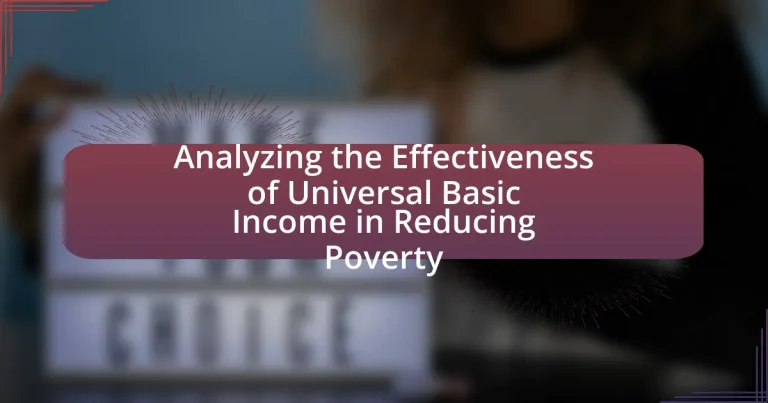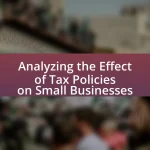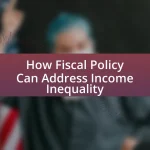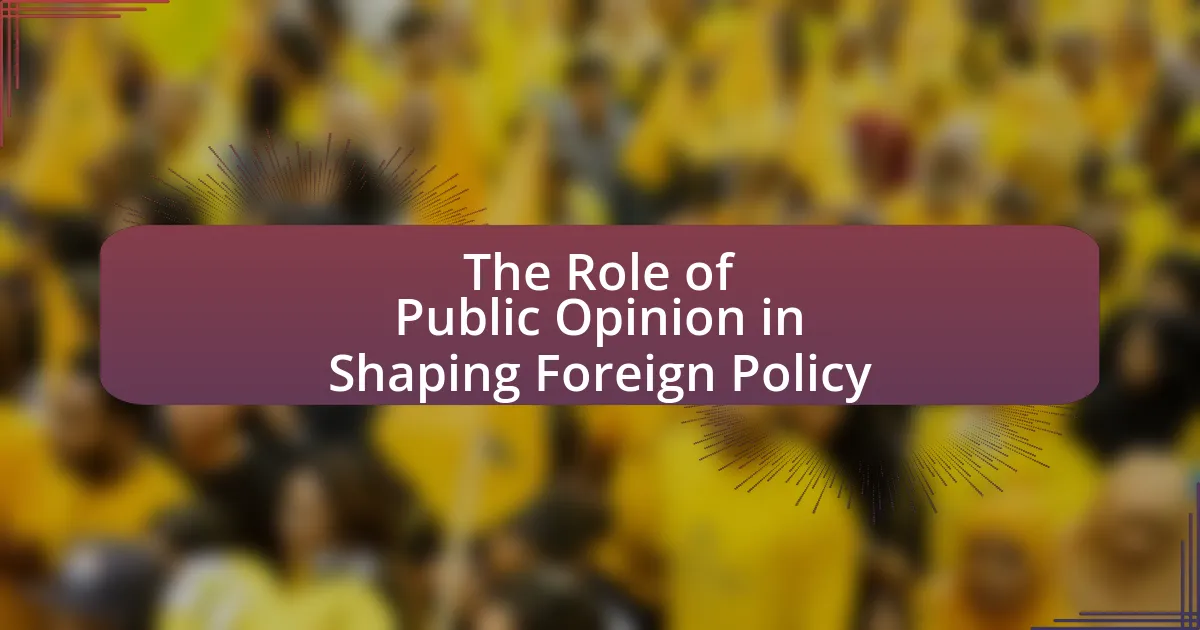Universal Basic Income (UBI) is a financial policy designed to provide all citizens with a regular, unconditional cash payment, aimed at ensuring a basic standard of living and reducing poverty. The article analyzes UBI’s effectiveness in alleviating poverty, highlighting key characteristics, theoretical foundations, and evidence from various studies, including notable trials in Finland and California. It discusses how UBI differs from traditional welfare programs, its potential to address income inequality, and the economic implications of its implementation. Additionally, the article addresses criticisms and challenges associated with UBI, including funding concerns and its impact on work incentives, while suggesting best practices for effective implementation and advocacy.
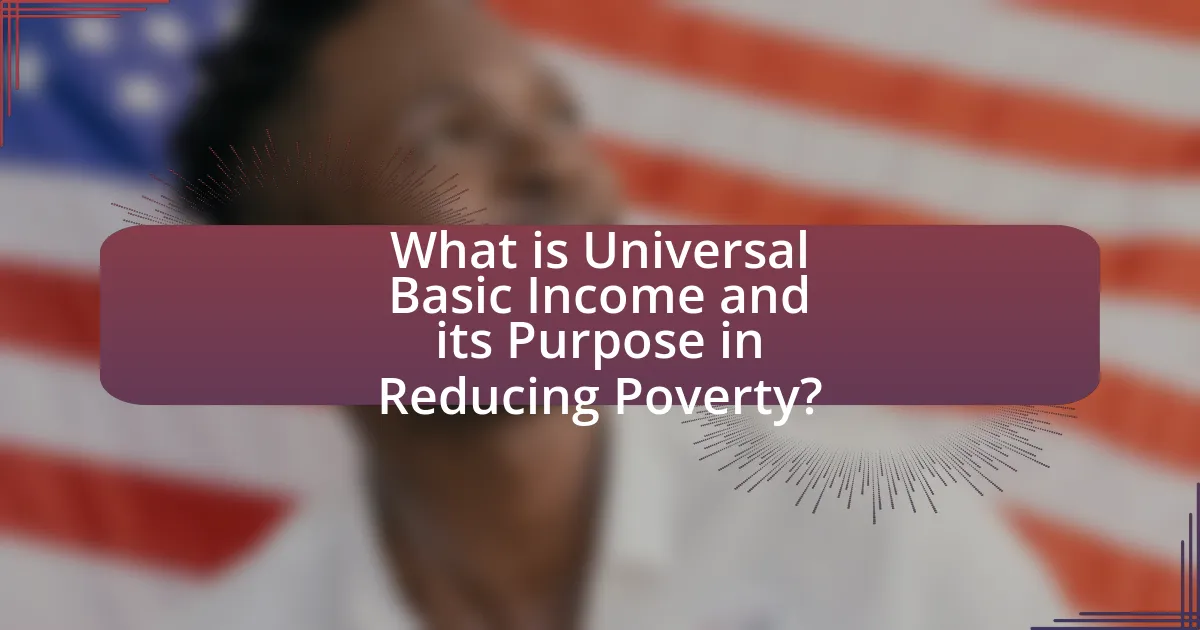
What is Universal Basic Income and its Purpose in Reducing Poverty?
Universal Basic Income (UBI) is a financial policy that provides all citizens with a regular, unconditional sum of money, regardless of other income. The primary purpose of UBI in reducing poverty is to ensure a basic standard of living, enabling individuals to meet their essential needs such as food, shelter, and healthcare. Research indicates that UBI can significantly decrease poverty rates; for instance, a study conducted in Finland from 2017 to 2018 found that recipients reported improved well-being and reduced financial stress, demonstrating UBI’s potential effectiveness in alleviating poverty.
How is Universal Basic Income defined?
Universal Basic Income (UBI) is defined as a financial payment made to all citizens or residents of a country, regardless of their income or employment status, intended to provide a minimum level of income to cover basic living expenses. This concept aims to reduce poverty and inequality by ensuring that everyone has a guaranteed income floor. Research conducted in various pilot programs, such as the one in Finland, demonstrated that UBI can improve well-being and reduce financial stress among recipients, supporting its effectiveness in addressing poverty.
What are the key characteristics of Universal Basic Income?
Universal Basic Income (UBI) is characterized by its unconditional cash payments to individuals, intended to provide financial security. UBI is typically provided on a regular basis, ensuring a consistent income floor for all citizens, regardless of employment status or income level. This system aims to reduce poverty and inequality by guaranteeing a basic standard of living. Research indicates that UBI can lead to improved mental health and increased economic stability, as evidenced by pilot programs in countries like Finland and Canada, which demonstrated positive impacts on recipients’ well-being and financial resilience.
How does Universal Basic Income differ from other welfare programs?
Universal Basic Income (UBI) differs from other welfare programs primarily in its unconditional nature and universality. Unlike traditional welfare programs that often require means testing or specific eligibility criteria, UBI provides a regular, unconditional cash payment to all individuals, regardless of their income or employment status. This approach aims to simplify the welfare system, reduce administrative costs, and eliminate stigma associated with receiving aid. For instance, pilot programs in Finland and Stockton, California, demonstrated that UBI can lead to improved financial stability and mental well-being among recipients, highlighting its potential effectiveness in reducing poverty compared to more conditional welfare programs.
Why is Universal Basic Income considered a solution to poverty?
Universal Basic Income (UBI) is considered a solution to poverty because it provides individuals with a guaranteed, unconditional cash payment, ensuring a basic standard of living. This financial support can alleviate immediate economic hardship, allowing recipients to meet essential needs such as food, housing, and healthcare. Research indicates that UBI can reduce poverty rates significantly; for instance, a study conducted in Finland showed that participants receiving UBI reported improved well-being and reduced financial stress. Additionally, UBI can stimulate local economies by increasing consumer spending, further contributing to poverty reduction.
What are the theoretical foundations supporting Universal Basic Income?
The theoretical foundations supporting Universal Basic Income (UBI) include social contract theory, economic security, and the capability approach. Social contract theory posits that individuals have a right to a basic level of economic support from the state, reflecting the idea that citizens contribute to society and should receive benefits in return. Economic security emphasizes the need for a safety net that ensures all individuals can meet their basic needs, which UBI directly addresses by providing unconditional cash payments. The capability approach, developed by economist Amartya Sen, argues that true poverty alleviation requires enhancing individuals’ capabilities to lead fulfilling lives, which UBI facilitates by granting financial freedom and reducing stress associated with economic instability. These foundations are supported by various studies, including the 2016 Finnish UBI experiment, which demonstrated positive effects on well-being and mental health among recipients, reinforcing the theoretical underpinnings of UBI as a viable policy for reducing poverty.
How does Universal Basic Income aim to address income inequality?
Universal Basic Income (UBI) aims to address income inequality by providing all individuals with a regular, unconditional cash payment, thereby ensuring a minimum standard of living. This financial support reduces the income gap by directly increasing the purchasing power of lower-income households, which can lead to improved access to essential services such as healthcare and education. Studies, such as the one conducted by the Roosevelt Institute, indicate that implementing UBI could significantly reduce poverty rates and enhance economic stability, demonstrating its potential effectiveness in mitigating income inequality.
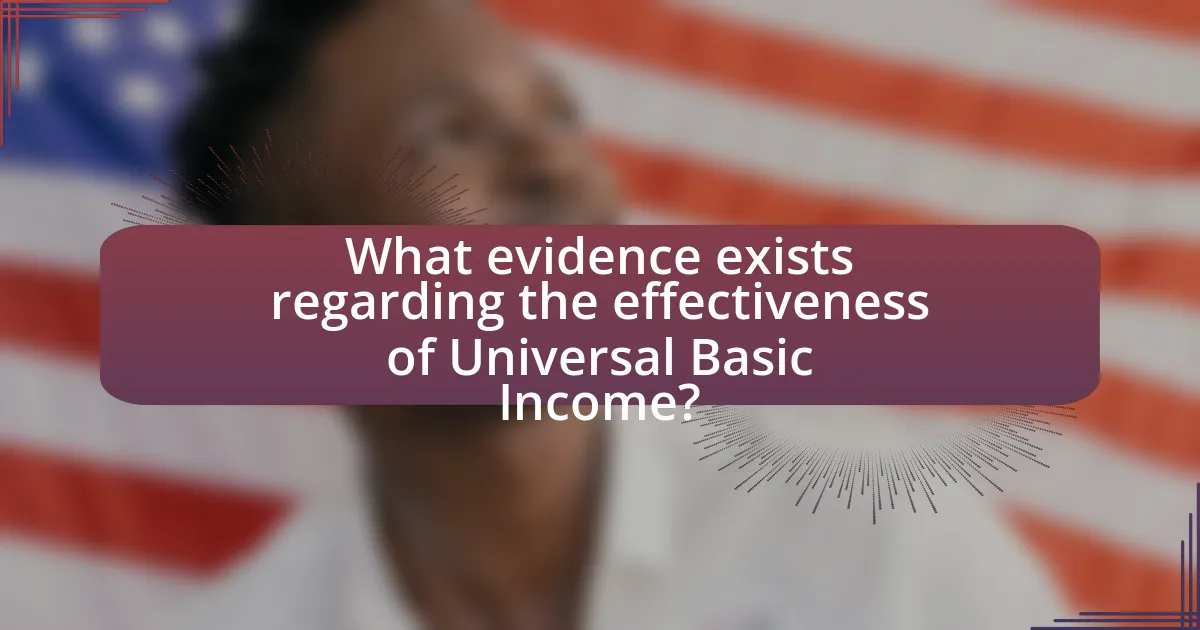
What evidence exists regarding the effectiveness of Universal Basic Income?
Evidence regarding the effectiveness of Universal Basic Income (UBI) indicates positive impacts on poverty reduction and economic stability. Studies, such as the Finnish UBI experiment conducted in 2017-2018, showed that recipients reported higher well-being and lower stress levels, while also experiencing no significant change in employment rates. Additionally, the Alaska Permanent Fund, which distributes annual dividends to residents, has demonstrated a reduction in poverty rates, with studies indicating that the program has contributed to improved financial security for low-income families. Furthermore, research from the Stockton Economic Empowerment Demonstration in California revealed that UBI recipients used the funds primarily for essential needs, leading to increased economic stability and improved mental health outcomes. These findings collectively support the argument that UBI can effectively reduce poverty and enhance overall quality of life.
What studies have been conducted on Universal Basic Income’s impact on poverty?
Several studies have been conducted on Universal Basic Income’s (UBI) impact on poverty, demonstrating its potential effectiveness. For instance, the Finnish Basic Income Experiment (2017-2018) provided 2,000 unemployed individuals with a monthly payment of €560, resulting in improved well-being and reduced stress, although it did not significantly increase employment rates. Another notable study is the Stockton Economic Empowerment Demonstration (SEED) in California, which gave $500 monthly to 125 low-income residents, leading to a 40% increase in full-time employment among participants and a reduction in poverty levels. Additionally, the Alaska Permanent Fund Dividend, which distributes oil revenue to residents, has shown a consistent decrease in poverty rates since its inception in 1982. These studies collectively indicate that UBI can positively influence poverty reduction and improve quality of life for recipients.
What were the findings of the most notable Universal Basic Income trials?
The findings of the most notable Universal Basic Income (UBI) trials indicate positive impacts on poverty reduction, mental health, and economic stability. For instance, the Finnish UBI trial (2017-2018) revealed that recipients reported higher levels of well-being and life satisfaction compared to non-recipients, although it did not significantly increase employment rates. Similarly, the Stockton Economic Empowerment Demonstration in California (2019-2020) showed that participants experienced reduced income volatility and improved mental health outcomes, with 40% of recipients using the funds for education and job training. The results from these trials suggest that UBI can enhance quality of life and provide financial security, contributing to poverty alleviation.
How do these studies measure the effectiveness of Universal Basic Income?
Studies measure the effectiveness of Universal Basic Income (UBI) through various methodologies, including randomized controlled trials, longitudinal surveys, and economic modeling. For instance, the Finnish UBI experiment utilized a randomized controlled trial design, providing a monthly payment to a group of unemployed individuals while comparing their outcomes to a control group. This approach allowed researchers to assess changes in employment rates, mental well-being, and overall quality of life. Additionally, longitudinal surveys track participants over time to evaluate the long-term impacts of UBI on poverty reduction and economic stability. Economic modeling further analyzes potential effects on labor markets and public spending, providing a comprehensive understanding of UBI’s effectiveness in alleviating poverty.
What are the economic implications of implementing Universal Basic Income?
Implementing Universal Basic Income (UBI) can lead to increased consumer spending, reduced poverty rates, and potential shifts in labor market dynamics. Economic studies, such as the one conducted by the Roosevelt Institute, suggest that UBI could boost GDP by up to 12.56% over eight years due to increased disposable income, which stimulates demand for goods and services. Additionally, UBI has been shown to reduce poverty levels significantly; for instance, the Finnish UBI experiment indicated improvements in well-being and financial security among recipients. However, funding UBI poses challenges, as it may require substantial tax increases or reallocation of existing welfare budgets, which could impact overall economic stability.
How does Universal Basic Income affect labor market participation?
Universal Basic Income (UBI) can lead to increased labor market participation by providing individuals with financial security, allowing them to pursue employment opportunities that align with their skills and interests. Research indicates that UBI can reduce the pressure to accept low-wage or undesirable jobs, enabling individuals to seek better employment options. For instance, a study conducted by the Roosevelt Institute found that a UBI of $1,000 per month could increase the labor force participation rate by 10% as individuals are empowered to invest in education or training, thereby enhancing their employability.
What are the potential costs and funding sources for Universal Basic Income?
The potential costs of Universal Basic Income (UBI) can be substantial, with estimates ranging from $1 trillion to $3 trillion annually in the United States alone, depending on the amount distributed and the population covered. Funding sources for UBI typically include increased taxation, such as higher income taxes on the wealthy, value-added taxes, carbon taxes, and reallocating existing welfare budgets. For instance, a study by the Roosevelt Institute suggests that a UBI of $1,000 per month could be funded through a combination of progressive taxation and reduced spending on other welfare programs, potentially leading to a net economic gain by stimulating consumer spending.
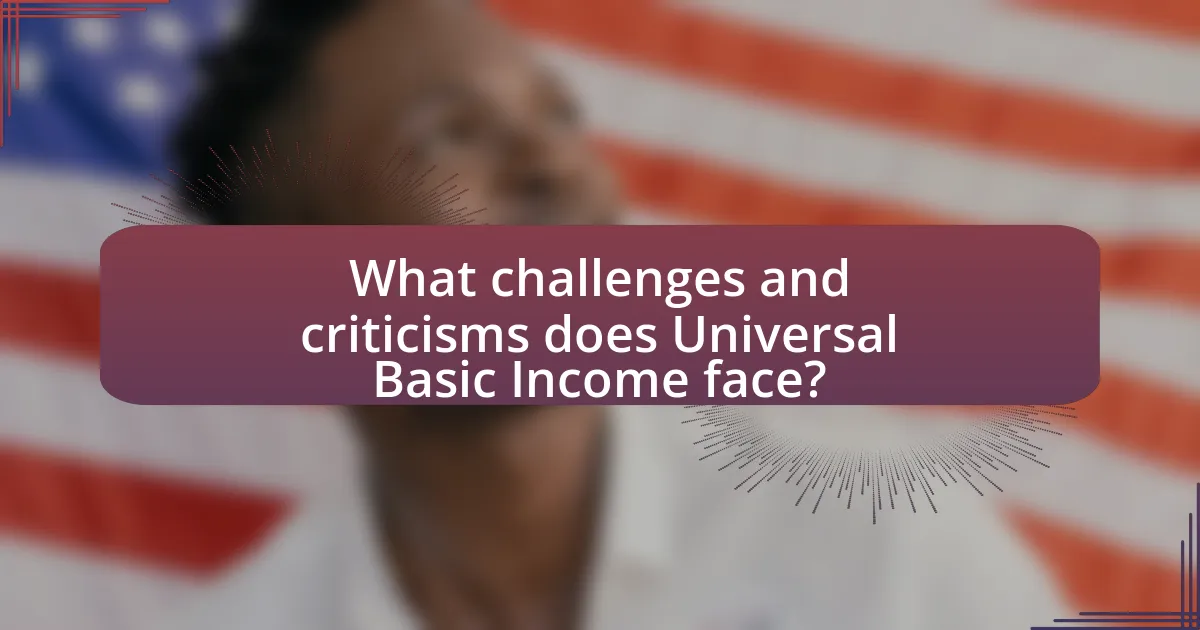
What challenges and criticisms does Universal Basic Income face?
Universal Basic Income (UBI) faces several challenges and criticisms, primarily concerning its economic feasibility, potential disincentives to work, and the adequacy of the income provided. Critics argue that funding UBI could require significant tax increases or reallocations from essential services, which may not be politically viable. For instance, a study by the Roosevelt Institute suggests that implementing UBI could cost over $3 trillion annually in the U.S., raising concerns about sustainability. Additionally, opponents claim that providing a guaranteed income might discourage individuals from seeking employment, potentially leading to a decrease in the labor force participation rate. Research from the University of California, Berkeley indicates that similar programs have shown mixed results regarding work incentives. Lastly, there are concerns about whether the amount provided through UBI would be sufficient to cover basic living expenses, as highlighted by various poverty studies indicating that many individuals require more than a minimal income to escape poverty effectively.
What are the main arguments against Universal Basic Income?
The main arguments against Universal Basic Income (UBI) include concerns about its affordability, potential disincentives to work, and the risk of inflation. Critics argue that funding UBI could require significant tax increases or reallocating funds from essential services, which may not be sustainable in the long term. Additionally, opponents suggest that providing a guaranteed income might reduce the motivation for individuals to seek employment, potentially leading to a decrease in the labor force participation rate. Furthermore, there is apprehension that an influx of cash into the economy could drive up prices, negating the benefits of the income provided. These arguments highlight the complexities and challenges associated with implementing UBI as a solution to poverty.
How do critics argue that Universal Basic Income could impact work incentives?
Critics argue that Universal Basic Income (UBI) could reduce work incentives by providing a guaranteed income that may lead individuals to opt out of the labor market. This perspective is supported by economic theories suggesting that when individuals receive unconditional payments, they may prioritize leisure or non-market activities over employment. For instance, a study by the National Bureau of Economic Research found that cash transfer programs can lead to a decrease in labor supply, particularly among low-income individuals who might otherwise seek work to meet their financial needs. Critics contend that this could exacerbate labor shortages in certain sectors and hinder overall economic productivity.
What concerns exist regarding the sustainability of Universal Basic Income programs?
Concerns regarding the sustainability of Universal Basic Income (UBI) programs primarily revolve around funding, economic impact, and potential inflation. Funding UBI requires substantial financial resources, which may necessitate increased taxation or reallocation of existing welfare budgets, raising questions about long-term viability. Economic impact concerns include the potential disincentive for work, as some argue that guaranteed income could reduce the motivation to seek employment. Additionally, there is apprehension that widespread implementation of UBI could lead to inflation, diminishing the purchasing power of the income provided. These factors collectively challenge the sustainability of UBI programs in the long run.
How can Universal Basic Income be effectively implemented?
Universal Basic Income (UBI) can be effectively implemented through a phased approach that includes pilot programs, funding mechanisms, and integration with existing welfare systems. Pilot programs, such as those conducted in Finland and Stockton, California, provide valuable data on UBI’s impact on poverty and employment, demonstrating that recipients often experience improved financial stability and mental health. Funding mechanisms can include reallocating existing welfare budgets, implementing progressive taxation, or utilizing revenue from automation and technology. Additionally, integrating UBI with existing welfare systems ensures that it complements rather than replaces essential services, thereby maximizing its effectiveness in reducing poverty.
What best practices can be drawn from existing Universal Basic Income experiments?
Best practices from existing Universal Basic Income (UBI) experiments include ensuring consistent and unconditional payments, which have been shown to improve financial stability and reduce poverty. For instance, the Alaska Permanent Fund Dividend provides residents with annual payments, resulting in decreased poverty rates and improved health outcomes. Additionally, experiments like the Stockton Economic Empowerment Demonstration revealed that recipients used UBI funds primarily for essential needs, such as food and housing, highlighting the importance of targeting basic living expenses. Furthermore, maintaining transparency and community engagement during UBI trials fosters trust and participation, as seen in the GiveDirectly program in Kenya, which effectively utilized local input to enhance program acceptance and effectiveness.
How can policymakers address the criticisms of Universal Basic Income?
Policymakers can address the criticisms of Universal Basic Income (UBI) by implementing pilot programs that provide empirical data on its effects. These pilot programs can demonstrate UBI’s potential to reduce poverty and improve economic stability, as seen in the Finnish UBI experiment, which showed increased well-being among participants. Additionally, policymakers can engage in public education campaigns to clarify misconceptions about UBI, emphasizing that it is not a replacement for existing welfare programs but a supplement aimed at enhancing financial security. By incorporating feedback from diverse stakeholders, including economists and social workers, policymakers can refine UBI proposals to address concerns about funding and potential disincentives to work.
What practical steps can be taken to advocate for Universal Basic Income?
To advocate for Universal Basic Income (UBI), individuals can engage in grassroots organizing, educate the public about UBI’s benefits, and collaborate with policymakers. Grassroots organizing involves forming local groups to raise awareness and gather support through community events and discussions. Educating the public can be achieved by sharing research findings, such as the 2020 study by the Roosevelt Institute, which found that UBI could significantly reduce poverty and stimulate economic growth. Collaborating with policymakers includes lobbying for UBI legislation, participating in public forums, and providing data-driven arguments to demonstrate UBI’s potential effectiveness in reducing poverty.
